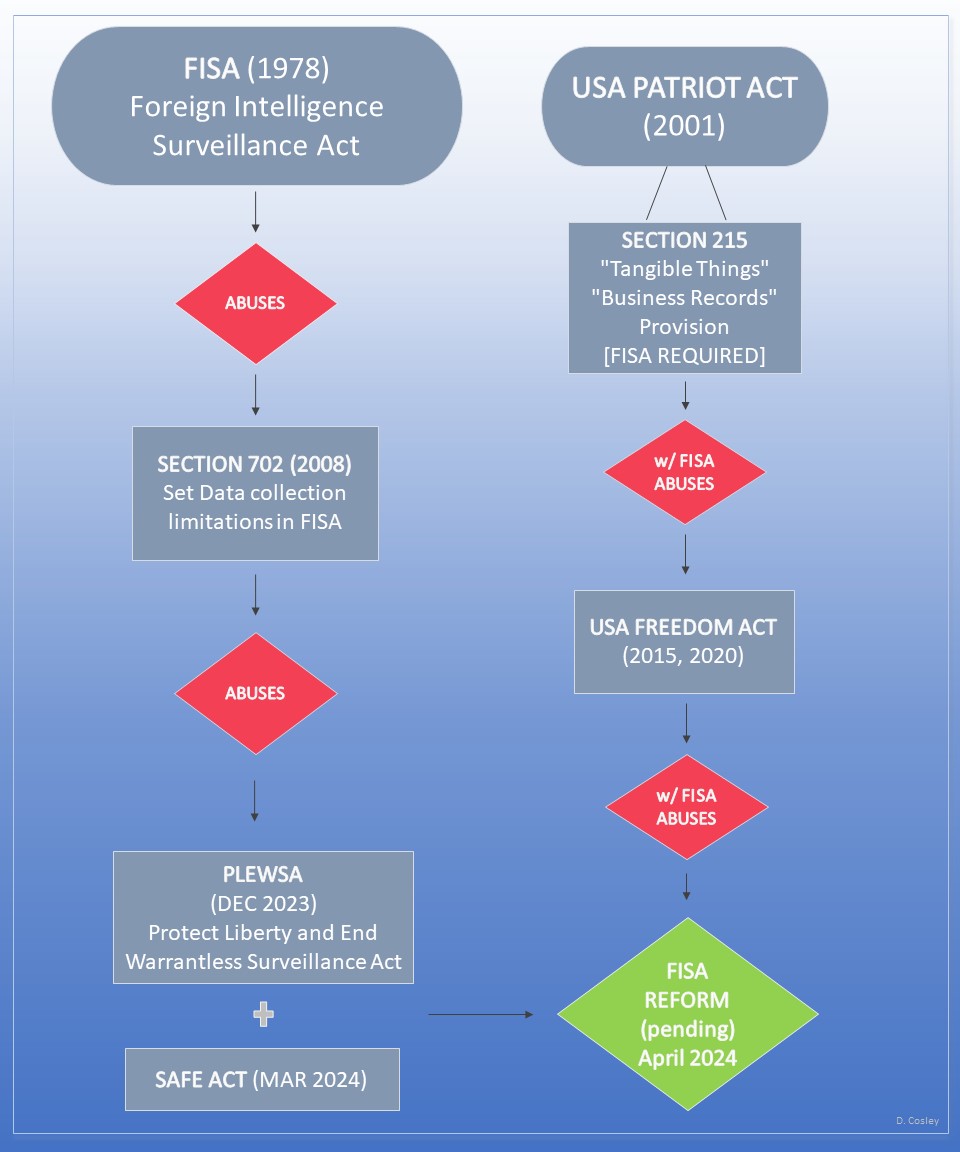Securing a nation's borders without border walls requires more intelligence and security measures than one could easily count, but accounted for they must be. And they are, to an extent.
Layer upon layer of security agencies exist to serve and protect our nation and they operate with various checks and balances that one would expect. The safeguards are vast and redundant, so much so that we feel relatively certain these agencies are doing the right things and are accountable to the right people.
Except for when they're not.
Too little and too late come the assigned responders to the citizens' rescue, post-infringement. They arrive to account for those who in the past have suffered meticulous targeting, surveillance, covert communications, stings, arrests, decimated livelihoods, families and other related satellites of the target's community and broader circle. Exacting and excruciating for any one person, perhaps deservedly so for a foreign enemy, but tragic and unjust for an innocent citizen and their six degrees of separation (i.e. friends, acquaintances and business associates).
Mistakes are made in any trade but in a nation such as ours, where the citizen and their constitutional rights is paramount to all manner of things, to target anyone and to do so without genuine oversight and accountability is absolute heresy. To target a foreign suspect and drag a US Citizen and their private, protected data with them may seem unthinkable and yet, it is already done. Millions of times over.
FISA Renewal
The week of April 7th, 2024 has been an active one for FISA reform. Representative Andy Biggs' (R-AZ) recent effort to combat warrantless surveillance via the Protect Liberty and End Warrantless Surveillance Act (PLEWSA) has failed. As has the bi-partisan Government Surveillance Reform Act. Following an agreement arrived at by House Speaker Mike Johnson Friday, the House then renewed the embattled Section 702 of the Foreign Intelligence Surveillance Act (FISA) for a period of two years rather than the standard five years.
Prior to the last six months, most had not heard the term FISA used except for those already following the mad fury and flurry of investigations surrounding the 2016 Russian collusion investigations and perhaps a few other notable hunts for dirt and justice since. But the passion which the casual observer notes in lawmakers has been more than palpable as the majority of media outlets have been breathlessly covering it as well. Good on them for a change!
Better for us, though, that we be brought up to date quickly so we may follow the outcome of this and more importantly, better understand the source of the concern and the controversy. We hear about warrantless surveillance and that alone is enough to turn heads. Most of the world's population is getting used to the idea that any of their electronic communications and activities could be tracked in some form or other but we have also been learning that government agencies are using work-arounds to obtain a US Citizen's data through a third party. Whether that may be used in an investigation is determined by our constitution.
We hear about warrantless surveillance and that alone is enough to turn heads. Most of the world's population is getting used to the idea that any of their electronic communications and activities could be tracked in some form or other but we have also been learning that government agencies are using work-arounds to obtain a US Citizen's data through a third party. Whether that may be used in an investigation is determined by our constitution.
What is FISA and where does Section 702 fit in?
In 1978, the Foreign Intelligence Surveillance Act (FISA) was enacted in response to the grievous abuses of power against US citizens who had been targeted, or swept up in a dragnet, with others suspected of conspiring and possibly executing crimes against our nation and its interests.
Section 702 was enacted by Congress in 2008 for the purpose of setting barriers and limitations on how US Citizens', including non-citizens living in the US, data may be collected. The key aspect of the necessity for this addition is that the surveillance conducted is only to be on foreign persons, not US Citizens. The data is collected and will sit within a large database just waiting to be queried for an investigation. A Foreign Intelligence Surveillance Court (FISC) with a specially appointed judge reviews the request to surveil the target and access this data by query.
The problem happens to surround the expanse of the data collected in the process. A target's phone data will include their contacts, their contacts' contacts and those contacts' contacts' data.  It is quite the overreach and as of now, citizens caught in the dragnet will have all of their communications data stored alongside the target's. We are assured that the data will not be accessed. If that were to change, though, investigators already have this data and do not have to obtain a warrant before accessing it.
It is quite the overreach and as of now, citizens caught in the dragnet will have all of their communications data stored alongside the target's. We are assured that the data will not be accessed. If that were to change, though, investigators already have this data and do not have to obtain a warrant before accessing it.
This violates a citizen's Fourth Amendment protections contrary to what would be required in any other scenario. The urgency that surrounds a foreign person plotting or acting against our country is great and there simply isn't enough time to follow that step, they argue. And details cannot be disclosed for fear of disrupting an ongoing investigation. One may recall that explanation given repeatedly as the 2016 election approached and a civilian Presidential candidate was targeted for fear of Russian election-interference. A US citizen. Caught in a net and then queried out of urgency and caution for the American people and their election.
What is the USA Freedom Act?
The USA Freedom Act was signed into law by President Obama on June 2, 2015 in response to bulk collection grievances and abuses related to Section 215 of the USA Patriot Act (2001). Also known as the Business Records provision, tangibles and other information may be collected on US citizens by investigators in order to obtain foreign intelligence information. This information may only be collected on US persons so long as the target of the investigation is not a US citizen.
It is important to understand the organization of these guardrails however inadequate some may be, to have a better means of challenging the lack of effectiveness when our expressed opposition is respectfully delivered to our representatives.
The graphic below provides you with the most basic structure of our predicament.

What is the SAFE Act (Security and Freedom Enhancement Act)
Bipartisan legislation passed via the SAFE Act (Security and Freedom Enhancement Act) on March 14th, 2024, is intended preserve FISA while closing loopholes such as the one that currently permits the acquisition of data through third-party brokers. It also requires limited conditions and processes for obtaining a warrant before accessing a US Citizen's data already stored in conjunction with a foreign target's.
In summary, there is no simple way to grasp the complexity and nearly endless layers that is FISA and American intelligence collection though we will explore some of these dynamics, key events and their outcomes in my next blog. The threat of overreach and infringement upon citizen's right to privacy and presumption of innocence has never been greater and it is upon each of us to acquire at a minimum, some understanding of the hierarchy that is poised above us through our tax-funded government agencies so we may return to a position of being poised above our government once again.






